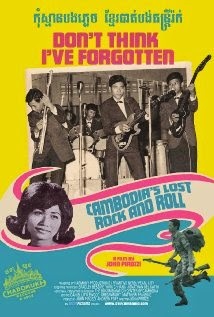
Malik Bendjelloul's Searching for Sugar Man and John Pirozzi's Don't Think I've Forgotten: Cambodia's Lost Rock and Roll are documentaries about music that became contraband during two repressive regimes, South Africa's Apartheid and Cambodia's Khmer Rouge era. That's about where the similarity ends. Searching for Sugar Man concentrated on Sixto Rodriguez, an American singer and Don't Think I've Forgotten, playing at Film Forum through Tuesday, April 28 deals with an idyllic period of Cambodia's early independence from French rule when Western influences from France's Johnny Hallyday, to Afro-Cuban, Santana and even Wilson Picket intermingled with a burgeoning Cambodian pop culture. That culture produced crooners with names like Sinn Sisamouth, Ros Sereysothea, Pan Ron and Mao Sereth who dominated the Pnom Penh musical scene. King Norodom Sihanouk, who ruled the country during those alternately repressive but culturally halcyon times, was the Maecenas of Cambodian art and created an atmosphere which allowed Cambodian music to move away from its purely traditional roots and participate in the tidal wave of 60's rock. "When we were young we loved being modern," is one of the first testimonies of the film which highlights a music that was characterized by a realism extraordinary even in the age of rock. "Please stop asking about your father," begins one lyric, 'he's a womanizer and an embarrassment." The Radio Diffusion Nationale Khmere which had broadcast Cambodian rock silenced it when the Khmer Rouge came to power in l975. Searching for Sugar Man was also different from Don't Think I've Forgotten in that the form it took was that of a mystery circling around the whereabouts of the elusive Sixto Rodriguez. There's no mystery about what happened to Sinn Sisamouth and his pals. Most of them were murdered.
{This was originally posted to The Screaming Pope, Francis Levy's blog of rants and reactions to contemporary politics, art and culture}